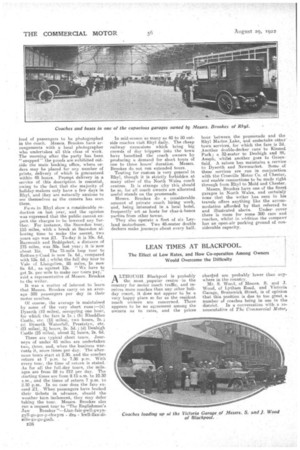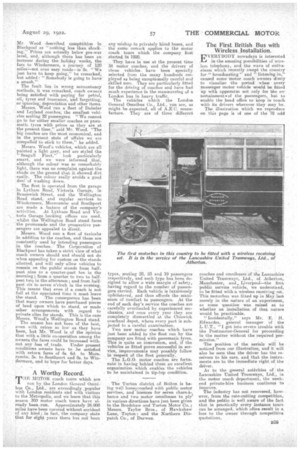LEAN TIMES AT BLACKPOOL.
Page 22

Page 23

If you've noticed an error in this article please click here to report it so we can fix it.
The Effect of Low Rates, and How Co-operation Among Owners Would Overcome the Difficulty
ALTHOUGH Blackpool is probably the most .popular centre in the country for motor coach traffic, and receives more coaches than any other holiday resort., it does not appear to be a very happy place so far as the resident coach owners are concerned. There appears to be no agreement among the owners as to rates, and the prices
charged are probably lower than anywhere in the country.
Mr. S. Wood, of Messrs. S. and J. Wood, of Lytham Road, and Victoria Garage, Brunswick Street, is of opinion that this position is due to too great, a number of coaches being in use in the
district. In a conversation with. a representative of The Commercial Motor, Mr. Wood described_ e.ompttition in Blackpool as "nothing less than shock. ing." Prices are actually below pre-war level, and, although there has been an increase during theholiday weeks, the fare to Windermere, a journey of 120 miles—not over easy roads—is 8s. "We just have to keep going," he remarked; but added : "Somebody is going to have a. smash." The fault lies in wrong accountancy methods, it was remarked, coach owners being satisfied with paying for pettoI, oil, tyres and insurance, and 'forgetting, or ignoring, depreciation and other items. Messrs. Wood run a fleet of Daimler and Leyland coaches; the smallest vehicles seating 22 passengers. "We cannot go in for either smaller coaches or pneumatic tyres with prices as they are at the present time," said Mr. Wood. "The big coaches are the most economical, and in the preaent state of affairs we are compelled to stick to them," he added. Messrs. Wood's vehicles, which are all painted a light grey, and are styled the Seagull Fleet," look particularly smart, and we were informed .that, although the colour was so remarkably light, there was no complaint against the • shade On the ground that it. showed dirt easily. The colour really avoids a good deal of washing down. The fleet is operated from the garage in Lytham Road, Victoria Garage, in Brunswick Street, and the Wellington -Road stand, and regular services to Windermere, Morecambe and Southport are made a feature of the company's activities.. At Lytham Road and Victoria Garage booking offices are used. whilst the Wellington Road stand faces the promenade and the prospective passengers are appealed to direct. Messrs. Wood run a fleet of taxicabs in addition to the coaches, and these are constantly used by intending passengers in the coaches. The Corporation of Blackpool has taken a strict view of what coach owners should and should not do when appealing for custom on the stands allotted, and will only allow vehicles to remain on the public stands from halfpast nine to a quarter-past ten in the morning; from a quarter to two to halfpast fairs in the afternoon; and from halfpast six to seven o'clock in the evening. This Means that even if a coach is not full at the appointed time it must leave the stand. The consequence has been that many owners have purchased pieces of land upon which to stand, or made other arrangements with regard to private sites for stands. This is the citie Messrs. Wood's Wellington Road stand. The season has not been of the best, even with nrices so low as they have been, but Mr. -Wood is of the opinion that with a little co-operation among the owners the fares could be increased with out any loss of trade. Under present conditions owners have to be satisfied with return fares of 4s. 6d. to Morecambe, 5s. to .Southport and Be-. toWindermere, and to hope for better days.
A Worthy Record.
THE MQTOB coach tours which are run by the London General Omnibus Co., Ltd., are exceedingly. popular with London residents and with visitors to the Metropolis, and we learn that this season 300 motor coach tours have already beenrun. Approximately 26.000 miles have been covered without accident of any kind ; in fact, the company state that for eight years there has not been
any mishap -to privately hired buses, and the same remark applies to the motor coach tours which the company first started in 1920.,
They have in use at the present time 38 motor coaches, and the drivers of these vehicleshave been specially selected from the many hundreds employed as being exceptionally careful and skilled men. They are particularly fitted for the driving of coaches and have had much experience in the manoeuvring of a London bus in heavy traffic.
The vehicles which the London General Omnibus Co., Ltd., run are, as might be expected, all of A.E C. manufacture. They are of three different
types, seating 28, 23 and 19 passengers respectively, and each type has been designed to allow a wide margin of safety, having regard to the number of passengers carried. Each vehicle is luxuriously upholstered, and thus affords the Maximum of 'comfort to passengers. At the end of each day's service the coaches are carefully overhauled by experienced mechanics, 4,nd once every year they are completely dismantled at the Chiswick overhaul depot, where every part is subjected to a careful examination. Two new motor coaches which have just been added to the fleet run by the company are fitted with pneumatic tyres. This is quite an innovation, and, if the vehicles so fitted prove successful in service, improvements may, possibly follow in reaped of the fleet generally. The L.G.O. motor coaches arc fortunate in having behind them an excellent organisation which enables the vehicles to be maintained in tip-top condition.
The Turton district of Bolton is being well honeycombed with public motor Services, and licences for seven chars-a, banes and two motor omnibuses to ply4 in various directions have just been given to the Bradshaw and Turton Motor Co. ; Messrs. Taylor Bros., of Hawkshaw Lane, Tuston ; and the Northern Dispatch Co., of Darwen,
The First_ British Bus with Wireless Installation.
EVERYBODY nowadays is interested in the amazing possibilities of wireless telephony, and the wave of enthusiasm which recently swept the country for " broadcasting" and " listening-in,' caused some -motor coach owners dimly to visualize the period when every passenger motor vehicle would be fitted up with apparatus not only for the eir tertainment•of the passengers, but to enable the head office to keep in touch with ite drivers wherever they may be.
The illustration which we reproduce on this page is of one of the 70 odd
coaches and omnibuses of the Lancashire United Tramways, Ltd., of Atherton, Manchester, and_ Liveriml—the first public service vehicle, we understand, to be fitted with a wireless receiving set. This motorbus was fitted up in May last merely in the nature of an experiment, as some question was raised as to whether an installation of that nature would be practicable. "Incidentally," says Mn. -E. H. Edwardes, general manager of the L.U.T., "I got into severe trouble with the Postmaster-General for proceeding in the matter without the required permission." The position of the aerials will be noticed from our illustration, and it will also be seen that the driver has the re. ceivers to his ears arid that the instruments are to the immediate right of the driver. As to the general activities of the Lancashire United Traanwa.ys, Ltd., in the motor coach department, the weekend private-hire business continues to improve.
The industry has not recovered, however, from the rate-cutting competition, and the public is well aware of the fact that in practically every instance tours can be arranged, which often result in a loss to the owner through competitive quotations.




























